- Home
- D. H. Lawrence
The Ladybird
The Ladybird Read online
A Project Gutenberg of Australia eBook
Title: The Ladybird (1923)
Author: D H Lawrence
eBook No.: 0200821.txt
Edition: 1
Language: English
Character set encoding: ASCII--7 bit
Date first posted: November 2002
Date most recently updated: November 2002
This eBook was produced by: Don Lainson [email protected]
Production notes: Nil
Project Gutenberg of Australia eBooks are created from printed editions
which are in the public domain in Australia, unless a copyright notice
is included. We do NOT keep any eBooks in compliance with a particular
paper edition.
Copyright laws are changing all over the world. Be sure to check the
copyright laws for your country before downloading or redistributing this
or any other Project Gutenberg file.
To contact Project Gutenberg of Australia go to http://gutenberg.net.au
Further information on contacting Project Gutenberg, the
"legal small print" and other information about this eBook may be found
at the end of this file.
** Welcome To The World of Free Plain Vanilla Electronic Books **
** eBooks Readable By Both Humans and By Computers, Since 1971 **
***** These eBooks Are Prepared By Thousands of Volunteers! *****
-----------------------------------------------------------------
A Project Gutenberg of Australia eBook
Title: The Ladybird
Author: D H Lawrence
How many swords had Lady Beveridge in her pierced heart! Yet there
always seemed room for another. Since she had determined that her
heart of pity and kindness should never die. If it had not been
for this determination she herself might have died of sheer agony,
in the years 1916 and 1917, when her boys were killed, and her
brother, and death seemed to be mowing with wide swaths through her
family. But let us forget.
Lady Beveridge loved humanity, and come what might, she would
continue to love it. Nay, in the human sense, she would love her
enemies. Not the criminals among the enemy, the men who committed
atrocities. But the men who were enemies through no choice of
their own. She would be swept into no general hate.
Somebody had called her the soul of England. It was not ill said,
though she was half Irish. But of an old, aristocratic, loyal
family famous for its brilliant men. And she, Lady Beveridge, had
for years as much influence on the tone of English politics as any
individual alive. The close friend of the real leaders in the
House of Lords and in the Cabinet, she was content that the men
should act, so long as they breathed from her as from the rose of
life the pure fragrance of truth and genuine love. She had no
misgiving regarding her own spirit.
She, she would never lower her delicate silken flag. For instance,
throughout all the agony of the war she never forgot the enemy
prisoners; she was determined to do her best for them. During the
first years she still had influence. But during the last years of
the war power slipped out of the hands of her and her sort, and she
found she could do nothing any more: almost nothing. Then it
seemed as if the many swords had gone home into the heart of this
little, unyielding Mater Dolorosa. The new generation jeered at
her. She was a shabby, old-fashioned little aristocrat, and her
drawing-room was out of date.
But we anticipate. The years 1916 and 1917 were the years when the
old spirit died for ever in England. But Lady Beveridge struggled
on. She was being beaten.
It was in the winter of 1917--or in the late autumn. She had been
for a fortnight sick, stricken, paralysed by the fearful death of
her youngest boy. She felt she MUST give in, and just die. And
then she remembered how many others were lying in agony.
So she rose, trembling, frail, to pay a visit to the hospital where
lay the enemy sick and wounded, near London. Countess Beveridge
was still a privileged woman. Society was beginning to jeer at
this little, worn bird of an out-of-date righteousness and
aesthetic. But they dared not think ill of her.
She ordered the car and went alone. The Earl, her husband, had
taken his gloom to Scotland. So, on a sunny, wan November morning
Lady Beveridge descended at the hospital, Hurst Place. The guard
knew her, and saluted as she passed. Ah, she was used to such deep
respect! It was strange that she felt it so bitterly, when the
respect became shallower. But she did. It was the beginning of
the end to her.
The matron went with her into the ward. Alas, the beds were all
full, and men were even lying on pallets on the floor. There was a
desperate, crowded dreariness and helplessness in the place: as if
nobody wanted to make a sound or utter a word. Many of the men
were haggard and unshaven, one was delirious, and talking fitfully
in the Saxon dialect. It went to Lady Beveridge's heart. She had
been educated in Dresden, and had had many dear friendships in the
city. Her children also had been educated there. She heard the
Saxon dialect with pain.
She was a little, frail, bird-like woman, elegant, but with that
touch of the blue-stocking of the nineties which was unmistakable.
She fluttered delicately from bed to bed, speaking in perfect
German, but with a thin, English intonation: and always asking if
there was anything she could do. The men were mostly officers and
gentlemen. They made little requests which she wrote down in a
book. Her long, pale, rather worn face, and her nervous little
gestures somehow inspired confidence.
One man lay quite still, with his eyes shut. He had a black beard.
His face was rather small and sallow. He might be dead. Lady
Beveridge looked at him earnestly, and fear came into her face.
'Why, Count Dionys!' she said, fluttered. 'Are you asleep?'
It was Count Johann Dionys Psanek, a Bohemian. She had known
him when he was a boy, and only in the spring of 1914 he and his
wife had stayed with Lady Beveridge in her country house in
Leicestershire.
His black eyes opened: large, black, unseeing eyes, with curved
black lashes. He was a small man, small as a boy, and his face too
was rather small. But all the lines were fine, as if they had been
fired with a keen male energy. Now the yellowish swarthy paste of
his flesh seemed dead, and the fine black brows seemed drawn on the
face of one dead. The eyes, however, were alive: but only just
alive, unseeing and unknowing.
'You know me, Count Dionys? You know me, don't you?' said Lady
Beveridge, bending forward over the bed.
There was no reply for some time. Then the black eyes gathered a
look of recognition, and there came the ghost
of a polite smile.
'Lady Beveridge.' The lips formed the words. There was
practically no sound.
'I am so glad you can recognize me. And I am so sorry you are
hurt. I am so sorry.'
The black eyes watched her from that terrible remoteness of death,
without changing.
'There is nothing I can do for you? Nothing at all?' she said,
always speaking German.
And after a time, and from a distance, came the answer from his
eyes, a look of weariness, of refusal, and a wish to be left alone;
he was unable to strain himself into consciousness. His eyelids
dropped.
'I am so sorry,' she said. 'If ever there is anything I can do--'
The eyes opened again, looking at her. He seemed at last to hear,
and it was as if his eyes made the last weary gesture of a polite
bow. Then slowly his eyelids closed again.
Poor Lady Beveridge felt another sword-thrust of sorrow in her
heart, as she stood looking down at the motionless face, and at the
black fine beard. The black hairs came out of his skin thin and
fine, not very close together. A queer, dark, aboriginal little
face he had, with a fine little nose: not an Aryan, surely. And he
was going to die.
He had a bullet through the upper part of his chest, and another
bullet had broken one of his ribs. He had been in hospital five
days.
Lady Beveridge asked the matron to ring her up if anything
happened. Then she drove away, saddened. Instead of going to
Beveridge House, she went to her daughter's flat near the park--
near Hyde Park. Lady Daphne was poor. She had married a commoner,
son of one of the most famous politicians in England, but a man
with no money. And Earl Beveridge had wasted most of the large
fortune that had come to him, so that the daughter had very little,
comparatively.
Lady Beveridge suffered, going in the narrow doorway into the
rather ugly flat. Lady Daphne was sitting by the electric fire in
the small yellow drawing-room, talking to a visitor. She rose at
once, seeing her little mother.
'Why, mother, ought you to be out? I'm sure not.'
'Yes, Daphne darling. Of course I ought to be out.'
'How are you?' The daughter's voice was slow and sonorous,
protective, sad. Lady Daphne was tall, only twenty-five years old.
She had been one of the beauties, when the war broke out, and her
father had hoped she would make a splendid match. Truly, she had
married fame: but without money. Now, sorrow, pain, thwarted
passion had done her great damage. Her husband was missing in the
East. Her baby had been born dead. Her two darling brothers were
dead. And she was ill, always ill.
A tall, beautifully-built girl, she had the fine stature of her
father. Her shoulders were still straight. But how thin her white
throat! She wore a simple black frock stitched with coloured wool
round the top, and held in a loose coloured girdle: otherwise no
ornaments. And her face was lovely, fair, with a soft exotic white
complexion and delicate pink cheeks. Her hair was soft and heavy,
of a lovely pallid gold colour, ash-blond. Her hair, her
complexion were so perfectly cared for as to be almost artificial,
like a hot-house flower.
But alas, her beauty was a failure. She was threatened with
phthisis, and was far too thin. Her eyes were the saddest part of
her. They had slightly reddened rims, nerve-worn, with heavy,
veined lids that seemed as if they did not want to keep up. The
eyes themselves were large and of a beautiful green-blue colour.
But they were full, languid, almost glaucous.
Standing as she was, a tall, finely-built girl, looking down with
affectionate care on her mother, she filled the heart with ashes.
The little pathetic mother, so wonderful in her way, was not really
to be pitied for all her sorrow. Her life was in her sorrows, and
her efforts on behalf of the sorrows of others. But Daphne was not
born for grief and philanthropy. With her splendid frame, and her
lovely, long, strong legs, she was Artemis or Atalanta rather than
Daphne. There was a certain width of brow and even of chin that
spoke a strong, reckless nature, and the curious, distraught slant
of her eyes told of a wild energy dammed up inside her.
That was what ailed her: her own wild energy. She had it from her
father, and from her father's desperate race. The earldom had
begun with a riotous, dare-devil border soldier, and this was the
blood that flowed on. And alas, what was to be done with it?
Daphne had married an adorable husband: truly an adorable husband.
Whereas she needed a dare-devil. But in her MIND she hated all
dare-devils: she had been brought up by her mother to admire only
the good.
So, her reckless, anti-philanthropic passion could find no outlet--
and SHOULD find no outlet, she thought. So her own blood turned
against her, beat on her own nerves, and destroyed her. It was
nothing but frustration and anger which made her ill, and made the
doctors fear consumption. There it was, drawn on her rather wide
mouth: frustration, anger, bitterness. There it was the same in
the roll of her green-blue eyes, a slanting, averted look: the same
anger furtively turning back on itself. This anger reddened her
eyes and shattered her nerves. And yet her whole will was fixed in
her adoption of her mother's creed, and in condemnation of her
handsome, proud, brutal father, who had made so much misery in the
family. Yes, her will was fixed in the determination that life
should be gentle and good and benevolent. Whereas her blood was
reckless, the blood of daredevils. Her will was the stronger of
the two. But her blood had its revenge on her. So it is with
strong natures today: shattered from the inside.
'You have no news, darling?' asked the mother.
'No. My father-in-law had information that British prisoners had
been brought into Hasrun, and that details would be forwarded by
the Turks. And there was a rumour from some Arab prisoners that
Basil was one of the British brought in wounded.'
'When did you hear this?'
'Primrose came in this morning.'
'Then we can hope, dear.'
'Yes.'
Never was anything more dull and bitter than Daphne's affirmative
of hope. Hope had become almost a curse to her. She wished there
need be no such thing. Ha, the torment of hoping, and the INSULT
to one's soul. Like the importunate widow dunning for her deserts.
Why could it not all be just clean disaster, and have done with it?
This dilly-dallying with despair was worse than despair. She had
hoped so much: ah, for her darling brothers she had hoped with such
anguish. And the two she loved best were dead. So were most
others she had hoped for, dead. Only this uncertainty about her
husband still rankling.
'You feel better, dear?' said the little, unquenched mother.
'Rather better,' came the resentful answer.
; 'And your night?'
'No better.'
There was a pause.
'You are coming to lunch with me, Daphne darling?'
'No, mother dear. I promised to lunch at the Howards with
Primrose. But I needn't go for a quarter of an hour. Do sit
down.'
Both women seated themselves near the electric fire. There was
that bitter pause, neither knowing what to say. Then Daphne roused
herself to look at her mother.
'Are you sure you were fit to go out?' she said. 'What took you
out so suddenly?'
'I went to Hurst Place, dear. I had the men on my mind, after the
way the newspapers had been talking.'
'Why ever do you read the newspapers!' blurted Daphne, with a
certain burning, acid anger. 'Well,' she said, more composed.
'And do you feel better now you've been?'
'So many people suffer besides ourselves, darling.'
'I know they do. Makes it all the worse. It wouldn't matter if it
were only just us. At least, it would matter, but one could bear
it more easily. To be just one of a crowd all in the same state.'
'And some even worse, dear.'
'Oh, quite! And the worse it is for all, the worse it is for one.'
'Is that so, darling? Try not to see too darkly. I feel if I can
give just a little bit of myself to help the others--you know--it
alleviates me. I feel that what I can give to the men lying there,
Daphne, I give to my own boys. I can only help them now through
helping others. But I can still do that, Daphne, my girl.'
And the mother put her little white hand into the long, white cold
hand of her daughter. Tears came to Daphne's eyes, and a fearful
stony grimace to her mouth.
'It's so wonderful of you that you can feel like that,' she said.
'But you feel the same, my love. I know you do.'
'No, I don't. Everyone I see suffering these same awful things, it
makes me wish more for the end of the world. And I quite see that
the world won't end--'
'But it will get better, dear. This time it's like a great
sickness--like a terrible pneumonia tearing the breast of the
world.'
'Do you believe it will get better? I don't.'
'It will get better. Of course it will get better. It is perverse
to think otherwise, Daphne. Remember what HAS been before, even in
Europe. Ah, Daphne, we must take a bigger view.'
'Yes, I suppose we must.'
The daughter spoke rapidly, from the lips, in a resonant,
monotonous tone. The mother spoke from the heart.
'And Daphne, I found an old friend among the men at Hurst Place.'
'Who?'
'Little Count Dionys. You remember him?'
'Quite. What's wrong?'
'Wounded rather badly--through the chest. So ill.'
'Did you speak to him?'
'Yes. I recognized him in spite of his beard.'
'Beard!'
'Yes--a black beard. I suppose he could not be shaven. It seems
strange that he is still alive, poor man.'
'Why strange? He isn't old. How old is he?'
'Between thirty and forty. But so ill, so wounded, Daphne. And so
small. So small, so sallow--smorto, you know the Italian word.
The way dark people look. There is something so distressing in
it.'
'Does he look VERY small now--uncanny?' asked the daughter.
'No, not uncanny. Something of the terrible far-awayness of a
child that is very ill and can't tell you what hurts it. Poor
Count Dionys, Daphne. I didn't know, dear, that his eyes were so
black, and his lashes so curved and long. I had never thought of
him as beautiful.'
'Nor I. Only a little comical. Such a dapper little man.'
'Yes. And yet now, Daphne, there is something remote and in a sad
way heroic in his dark face. Something primitive.'
'What did he say to you?'
'He couldn't speak to me. Only with his lips, just my name.'

 Look! We Have Come Through!
Look! We Have Come Through!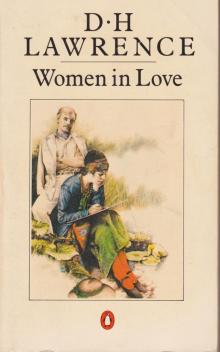 Women in Love
Women in Love The Ladybird
The Ladybird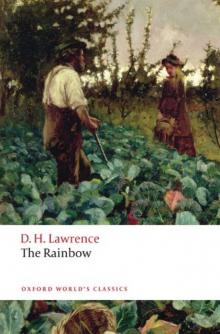 The Rainbow
The Rainbow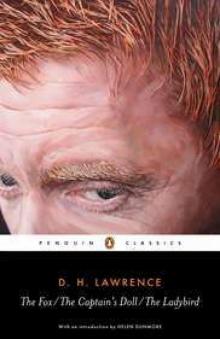 The Captain's Dol
The Captain's Dol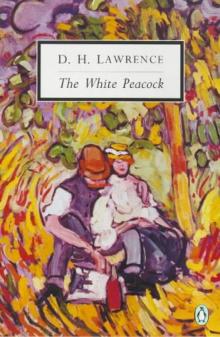 The White Peacock
The White Peacock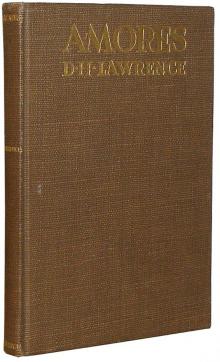 Amores
Amores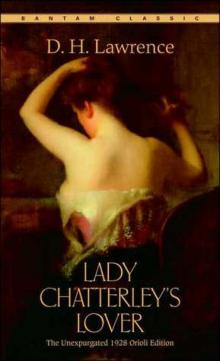 Lady Chatterley's Lover
Lady Chatterley's Lover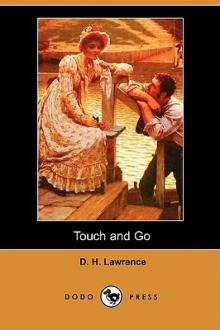 Touch and Go
Touch and Go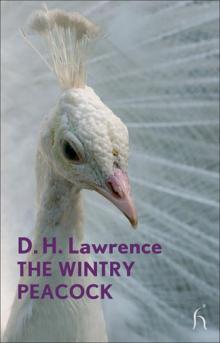 The Wintry Peacock
The Wintry Peacock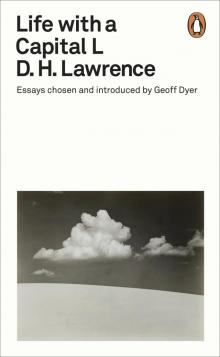 Life with a Capital L
Life with a Capital L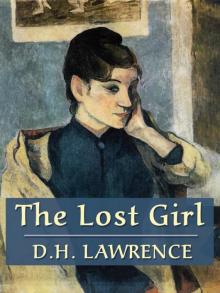 The Lost Girl
The Lost Girl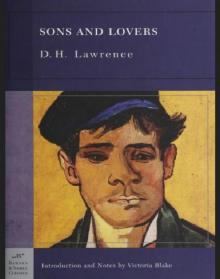 Sons and Lovers
Sons and Lovers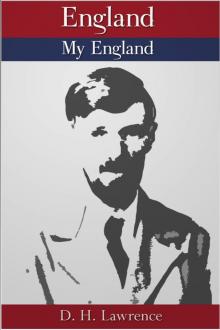 England, My England
England, My England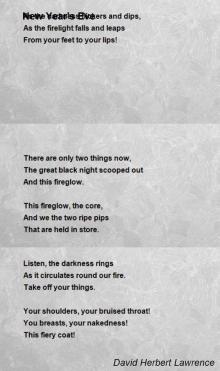 New Poems
New Poems Twilight in Italy
Twilight in Italy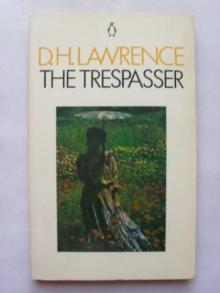 The Trespasser
The Trespasser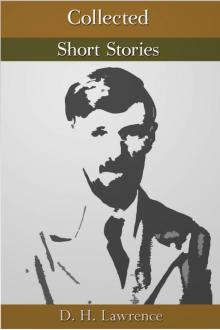 The Collected Short Stories
The Collected Short Stories The First Lady Chatterley's Lover
The First Lady Chatterley's Lover Kangaroo
Kangaroo Bay
Bay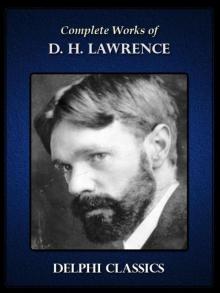 Complete Works of D.H. Lawrence
Complete Works of D.H. Lawrence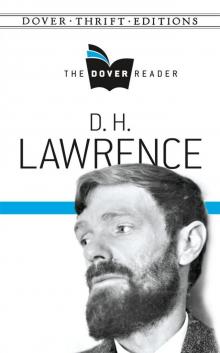 D H Lawrence- The Dover Reader
D H Lawrence- The Dover Reader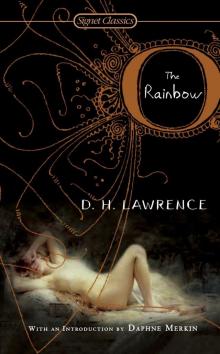 The Rainbow (100th Anniversary ed.)
The Rainbow (100th Anniversary ed.)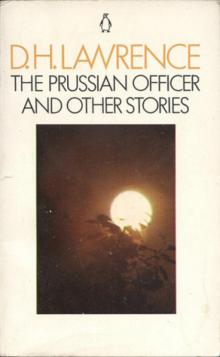 The Prussian Officer
The Prussian Officer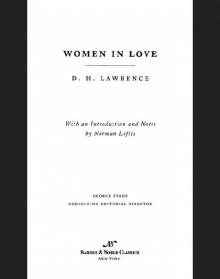 Women in Love (Barnes & Noble Classics Series)
Women in Love (Barnes & Noble Classics Series)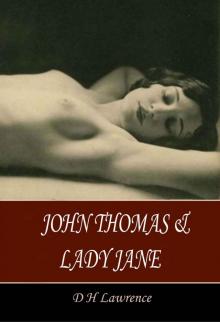 John Thomas and Lady Jane
John Thomas and Lady Jane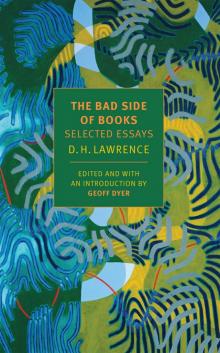 The Bad Side of Books
The Bad Side of Books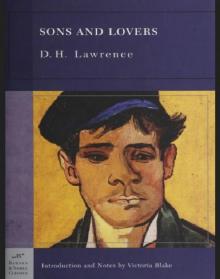 Sons and Lovers (Barnes & Noble Classics Series)
Sons and Lovers (Barnes & Noble Classics Series) Selected Stories
Selected Stories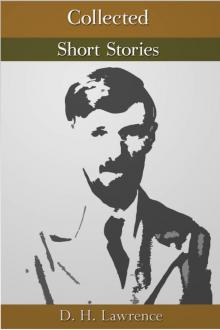 Collected Short Stories
Collected Short Stories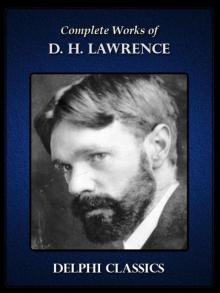 Complete Works of D.H. Lawrence (Illustrated)
Complete Works of D.H. Lawrence (Illustrated)